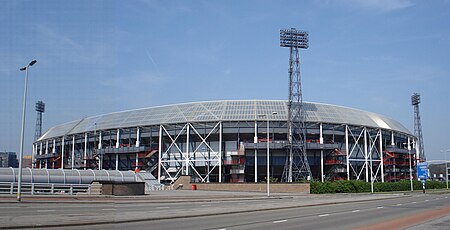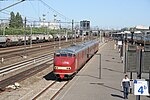De Kuip

Stadion Feijenoord (pronounced [ˌstaːdijɔɱ ˈfɛiənoːrt]), more commonly known by its nickname De Kuip (pronounced [də ˈkœyp], the Tub), is a stadium in Rotterdam, Netherlands. It was completed in 1937. The name is derived from the Feijenoord district in Rotterdam, and from the club with the same name (although the club's name was internationalised to Feyenoord in 1973). The stadium's original capacity was 64,000. In 1949, it was expanded to 69,000, and in 1994 it was converted to a 51,117-seat all-seater. In 1999, a significant amount of restoration and interior work took place at the stadium prior to its use as a venue in the UEFA Euro 2000 tournament, although capacity was largely unaffected.
Excerpt from the Wikipedia article De Kuip (License: CC BY-SA 3.0, Authors, Images).De Kuip
Olympiaweg, Rotterdam IJsselmonde
Geographical coordinates (GPS) Address External links Nearby Places Show on map
Geographical coordinates (GPS)
| Latitude | Longitude |
|---|---|
| N 51.893894444444 ° | E 4.5232527777778 ° |
Address
Stadion Feijenoord (De Kuip)
Olympiaweg
3077 AA Rotterdam, IJsselmonde
South Holland, Netherlands
Open on Google Maps






